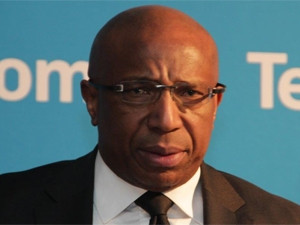
Telkom has delivered a solid performance, buoyed by its mobile business and the consolidation of Business Connexion (BCX).
The company, this morning, released its interim results for the six months ended 30 September.
Among the highlights, Telkom's operating revenue was up 20.6% to R20.2 billion and net operating revenue up 3.3% to R13.8 billion.
The telco's earnings before interest, taxes, depreciation and amortisation (EBITDA) increased 4.6% to R5.3 billion with an EBITDA margin of 26.1%. Headline earnings per share increased 19.7% to 336c. Capex increased 55.8% to R3.6 billion, with capex to revenue of 18%. The group's net cash and cash equivalents increased to R1.8 billion, supporting the interim dividend of 131c per share.
"The group delivered a solid performance in a tough economy where businesses continue to operate under pressure," says Telkom Group CEO Sipho Maseko.
"The consolidation of BCX, as well as the satisfactory performance of our mobile business, drove revenue performance during the six months. The mobile business has contributed positively to the group's EBITDA in the reporting period. Our multi-year business transformation also contributed positively. I am pleased that we remain on track with our market guidance, despite the macro-economic challenges."
FreeMe push
Telkom says BCX was consolidated for the six months, reporting revenue of R3.6 billion compared to one-month revenue of R489 million in the prior corresponding period. Excluding BCX, operating revenue and net operating revenue grew 2% and 0.9% respectively attributable to the mobile business.
Mobile voice and subscriber revenue increased 30% to R520 million (September 2015: R400 million). This is on the back of a 42% increase in the number of active mobile subscribers and resulted in the mobile business contributing positively to group EBITDA for the first time since its launch.
The mobile business recorded strong service revenue of 36.7%, driven by strong customer growth of 42.3% to 3.2 million active customer base. However, the blended ARPU was relatively flat at R89. Mobile broadband revenue grew 43.2% to R1 billion supported by 2.3 million mobile broadband customers, an increase of 44.5% compared to the prior corresponding period.
"The splendid performance in our mobile division was assisted by the complete overhaul of our mobile product offering in the form of FreeMe, the launch of new stores and sales channels as well as competitive products and pricing such as 'Deal of the Month' campaigns," Maseko says.
FreeMe, unveiled in July, offers customers a data bundle with voice, WhatsApp calls, free text and free WiFi. According to an analysis by Tariffic, the FreeMe packages are the top choice for high data and voice users in SA.
"FreeMe continues to be a very popular offering with customers and has performed even better than our initial expectations. We saw increased gross connections from both existing customers and new to franchise customers," says Maseko.
Despite the increased competition in the market, we are in a good position to execute on our strategy.
Telkom Group CEO Sipho Maseko
In the six-month period, Telkom sold approximately 170 000 prepaid FreeMe bundles, with over 70% of sales coming through the company's channels.
"Our mobile business has been able to establish itself as a meaningful player in the market. We intend growing our scale in the mobile market through focusing in the post-paid and data market in which we are already making inroads," says Maseko.
Mophatlane effect
As from November, Telkom says the enterprise business has been fully integrated with BCX under the leadership of Isaac Mophatlane as CEO of the merged entity.
"I'm delighted to announce that synergies were already realised through cross-selling to each other's customer base, thanks to a go-to-market strategy which was well-received by customers. In addition, the teams won business together as they leveraged on their ability to offer end-to-end solutions to enterprise customers," says Maseko.
The telco says Telkom Business Connexion remains a key growth platform for the group through which, among others, cloud computing and the Internet of things are delivered.
However, it says the positive contribution by the mobile and BCX divisions was partly offset by the decline in fixed-line voice revenue.
Fixed-line voice usage and subscription revenue decreased by 4% to R7 billion (September 2015: R7.3 billion) driven by competition, mobile substitution, a 7% decline in the number of lines and customers migrating to lower value bundled offerings.
"Despite the increased competition in the market, we are in a good position to execute on our strategy. However, the tough economic environment presents a challenge, as Business Connexion, including the enterprise business, is particularly impacted by these adverse conditions. We will continue to deploy capital to the growth areas of the business, which will ultimately grow our revenue. Our capital investment has given priority to fibre to the premises and the mobile business as we see these areas as growth platforms for our businesses," says Maseko.
Telkom will continue to modernise its network with the intention to migrate customers from legacy systems to fibre. This programme is expected to increase network utilisation and, over time, improve returns, the company says.
The board has decided to amend the current dividend policy to a total dividend distribution of 60% of headline earnings for the year, with an interim dividend of 40% of interim headline earnings. Therefore, an ordinary interim dividend of 131c per share (March 2016: 270c) in respect of the period ended 30 September 2016 has been declared.
"We will remain efficient and exercise cost and capital discipline throughout the business. We will also continue to focus on skills and expertise, simplification of processes and ongoing upgrade of our IT systems and network to ensure the sustainability of our business and improved customer services," concludes Maseko.
Share